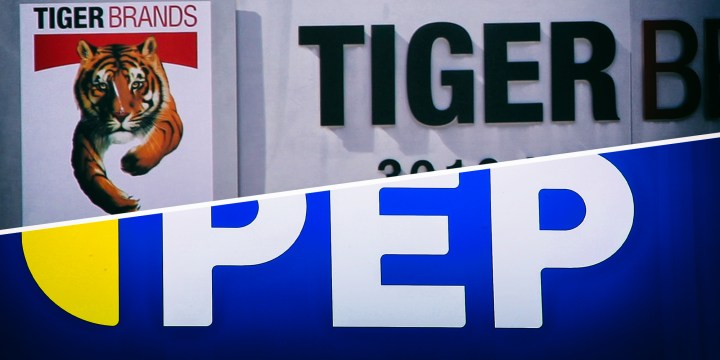COMPANIES
Pepkor sounds alarm on social grant bottlenecks; Tiger Brands highlights toll of power crisis

Discount retailer Pepkor and food producer Tiger Brands posted interim results on Tuesday that highlighted the surging costs of the power crisis to both business and consumers. And Pepkor flagged a deeply worrying trend impacting its low-income customers: disruptions to the flow of social grant payments.
The spiralling costs of the power crisis which Pepkor and Tiger Brands both flagged in their results are clearly unnerving investors. Tiger Brands’ share price tanked 15% while Pepkor’s dropped over 9%.
Let’s start with Pepkor, which reported an almost 12% decrease in headline earnings per share for the six months to the end of March 2023.
The discount retailer, which owns household brands such as Pep, Tekkie Town and Incredible Connection, noted that its customers “have no choice but to prioritise spending on necessities to contend with high levels of inflation, in particular, the increased cost of food and transport”.
“Customers’ ability to earn an income is also impacted by unprecedented levels of electricity load shedding and disruption in social grant payments,” the company said, without elaborating.
This points to concerns raised earlier this year by Open Secrets and Black Sash about social grants getting lost in the mail after Postbank assumed responsibility for part of their administration.
Read more in Daily Maverick: Social grant payments are a mess – and the public needs answers from Sassa, Sapo and Postbank
Social grant recipients comprise a key customer base for Pepkor, so if payments are late – or perhaps in some cases not arriving at all – it will be one of the first businesses to feel the pinch.
As a lifeline that is expected by March next year to reach 27 million of the poorest and most vulnerable South Africans, any failure on this front would be a profound social crisis.
CEO Pieter Erasmus said in the presentation of the results that Pepkor had to respond to this and the other challenges the group’s customers face – like declining income, high inflation and rising credit costs – by “making sure that the goods that we sell remain affordable … a lot of the goods are essential needs for our customers”.
Pepkor also noted how the power crisis is raising the cost of living directly for poor households.
“Many of the group’s customers have adapted their shopping behaviour as they are forced to travel further to access shopping complexes that are able to remain fully operational during load shedding,” the company said.
Longer travel simply raises the costs of shopping, in money and time, and it is mostly poor households that are getting squeezed.
On the direct costs of the rotational power cuts to its business, Pepkor said that “trading hours lost by the group as a result of load shedding increased by close to 500% during this period (211,000 hours). Diesel costs increased by 142% to R72-million for the period as a result of load shedding.”
The group, which also operates in other African countries and Brazil, still managed in this woeful environment to open 168 new stores, expanding its retail base to 5,929 stores.
Tiger Brands, for its part, posted effectively flat headline earnings in its interim results, and while revenue rose 19% to R19.4-billion, this was driven by price inflation of 17% and volumes declined 1%. So increased revenue is not flowing to the bottom line. The upshot was that group operating income fell 9% to R1.4-billion.
“Tiger Brands’ performance for the six months ended 31 March 2023 was impacted by a challenging operating environment due to prolonged periods of load shedding, while high levels of inflation and lower disposable income adversely impacted consumer behaviour in terms of volumes and basket mix,” the group said.
“With consumer confidence continuing to decline, stubbornly high levels of food inflation and a significant increase in interest rates, consumers are becoming more value conscious and price elasticities are rising.”
This mirrors what Pepkor had to say: cash-strapped consumers are changing their consumption habits because times are getting tougher.
And, of course, the costs of the power crisis for Tiger Brands’ business are mounting.
“Although cost-saving initiatives and supply chain efficiencies are delivering ahead of plan, these were not enough to counter the high level of input cost inflation, further impacted by the cost of operating in a constrained electricity environment,” the company said.
“The total cost of load shedding amounted to R76-million for the period, relative to R12-million in the corresponding period last year, resulting in incremental energy costs of R48-million. As a result, gross margins declined to 27.0% from 29.2% last year.”
Looking ahead, the group cautioned that the costs of grappling with the power outages were set to surge.
“Operating costs are expected to rise significantly as a consequence of higher levels of load shedding during the winter season,” it said.
These two companies have a wide customer base in South Africa and so their concerns and performance are a reflection of broad social and economic trends.
As winter sets in and Stage 8 power cuts loom, with the rand on the ropes – it hit a new low on Monday of 19.86/dollar – those trends look set to worsen. DM

















Comments - Please login in order to comment.